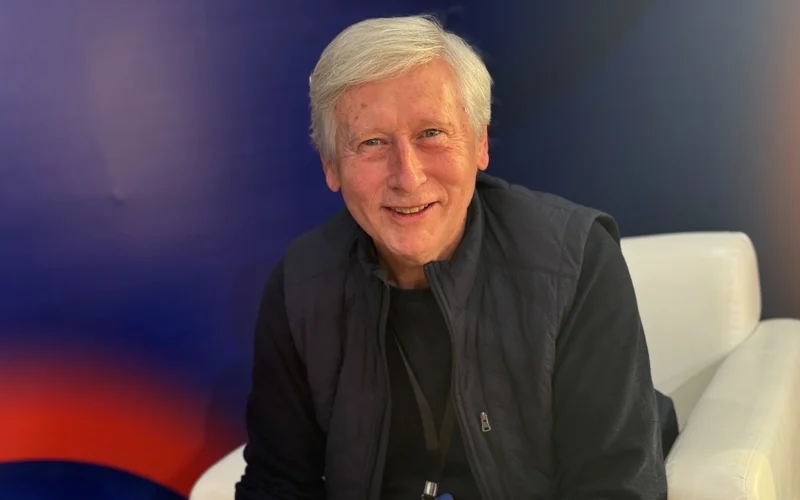Celebrate your own country — Max Howard on AI, animation, and Kazakh culture
Kazinform News Agency continues its coverage from the sidelines of the New Vision 2025 forum in Almaty. As part of the event, Kazinform spoke with Max Howard, former President of Warner Bros. Feature Animation and Walt Disney Studios. In an exclusive interview, he discussed the impact of AI and explained why Kazakhstan’s culture holds great potential for storytelling.

How do you think AI will affect our future?
— I think AI is going to affect every part of our lives — both our personal lives and our professional ones. My industry, of course, is the movies, and it could have an exponential impact on us. Everything I think or say about movies also reflects on our personal lives. The more we use AI, the more we have to consider what we’re not using people for. If we stop using people, then what happens to our economy? So on one level, it’s fantastic.
I’ve worked in the movie industry, particularly in animation, for many years, and we’ve always adopted new technologies. When I started out, everything was done with pencil on paper. Then came digitization, and we began painting digitally. In live action, we started filming digitally. We’ve embraced all of these innovations.
When it comes to artificial intelligence, though, the concern is that it’s super-intelligent, hyper-intelligent. Right downstairs at this very forum, there’s a robot walking around. It moves, but it doesn’t yet have true intelligence. How far away are we from that point? That’s what we need to think about.
We have to ride artificial intelligence. Imagine a bucking bronco — if you’re on that horse, you’ve got to hold on tight. Because if we let go, it could get away from us. And once it does, its intelligence might begin to question who we are and possibly rule over us — or even eliminate us.
Now, that’s a movie-maker’s version of a disaster scenario, but there’s a hint of truth in it. AI can do so much, and we really need to consider how we use it. My fear is that technology could eliminate too many jobs. In theory, I could make a film using technology alone — but should I?
What happens to the artists who used to work on those films? And not just in animation — in every industry. At some point, we might face a situation where people no longer earn money, forcing us to rethink the entire global economic system.
These are incredibly exciting times, but also challenging ones. I’ve noticed that younger people are far less afraid of AI than I am — maybe it’s an age thing. The older you get, the more the fear factor kicks in. That’s my take on AI. I embrace it and think it’s fantastic, but it must be managed carefully.
As a producer who worked on globally known animated movies like Spirit, which drew inspiration from a rich cultural background, what kind of film inspired by local nomadic culture would you create?
— Over the years, I’ve learned a lot about Kazakhstan, and whenever I visit a new country, I always explore its mythology. When I come somewhere like Kazakhstan, I encourage people to tell their own stories.
I’d love nothing more than to make a film that celebrates some aspect of life here, because it’s such a fascinating country — and still relatively unknown. Kazakhstan and this whole region have an extraordinary history, one that’s largely untold to the rest of the world.
There are stories here that can both tell and celebrate Kazakh culture. But you must find a theme within the story — a universal message that resonates globally.
Think of Finding Nemo. It’s set under the sea, but it’s not really about fish — it’s about human emotion. What you’d want to do with a Kazakh story is to highlight emotions that everyone can relate to, no matter where they live.
That’s not too difficult, because when we strip away politics and everything else, most people are fundamentally the same. When I come here, I immediately feel at home. I feel immersed in a wonderful culture, and I’m not intimidated by anything unfamiliar.
There’s a door here that you can walk through and learn so much. The key is to find a story whose characters and themes will travel — and through that, introduce the world to the visual identity of Kazakh culture: its landscapes, colors, and patterns.
I mean, even in the West, yurts are popular — we set them up at music festivals. But this is the home of the yurt; this is where it all began. There’s so much here to celebrate, and those stories will travel.
What I tell people here is simple: You don’t need to imitate movies from other countries. You just need to celebrate your own — and tell your story in a way that can reach the rest of the world.
Earlier, Kazinform published exclusive interviews with Electronic Arts founder William “Trip” Hawkins and award-winning U.S. entrepreneur Jeff Hoffman, who also attended the forum.
